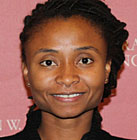 Appointment: Larson Fellow, 2013
Appointment: Larson Fellow, 2013
Area of study: Sociology, History, Latin American Studies
Affiliation(s): University of Richmond
Kluge Center project: Madness, State, and Society in Rio de Janeiro, 1808-1940
Residency: September 2013 – March 2014
February 10, 2014
The following interview with Dr. Manuella Meyer, David B. Larson Fellow in Health and Spirituality at The John W. Kluge Center, was conducted by Kluge Center Program Specialist Jason Steinhauer.
Q: Tell us about your research.
A: I’m working on my book manuscript, currently titled “National Melancholia: Madness, State and Society, 1808-1930.” It’s an examination of politics and medicine primarily seen through the lens of psychiatrists. I am interested in how a given society defines madness at a particular moment and how, psychiatrists, in addition to other actors, have attempted to manage it.
Q: How do madness and mental health get defined?
A: The project understands madness as a real illness that affects, and continues to impact, various groups and communities. Nonetheless, it is not transhistorical. Insanity requires analysis not only of the individual mad person, but also of the social, political, institutional, and professional structures that determine how and why a society treats that person as mad. During a time of rapid socio-political and economic transformation, known in Brazilian history as the Imperial and Old Republic eras, I investigate how race, gender, class, and anxieties about modernity undergird ideas about madness and mental health.
Q: How do notions of power play into this?
A: Issues of power are at the center of this project. During the time period under investigation, psychiatrists warned of crisis as they surveyed Rio de Janeiro. Fluent in the argots of criminology, eugenics, and degeneration theory (the notion that national decline was due to the supposed inferiority of Brazil’s racial composition), psychiatrists championed science and expertise to address not only mental illness but a range of issues such as poverty, crime, and delinquency. These approaches played a fundamental role in changing the professional position of psychiatry from a peripheral discipline of marginal scientific status to a prominent field able to provide the state with a framework to address both medical and socio-political concerns.
Q: Are there strict definitions of madness and do they evolve through the period that you’re researching?
A: Absolutely. Definitions and understandings of madness evolve over time. There is not one particular definition. For example, late nineteenth Brazilian psychiatrists perceived that conversing with spirits (i.e. the ability to communicate with the dead) was in and of itself a form of mental illness. In contrast, this practice was a critical component of spiritist mediums’, candomblé (a syncretic Afro-Brazilian religion) healers’, and their followers’ respective cosmologies.
Q: Why choose Brazil for this topic?
A: Brazil is popularly understood as a place of great contrasts, a place where high-rise luxury hotels are a few feet away from sprawling favelas, a place where the wealthy and the poor challenge and intimidate one another. During a visit to Rio de Janeiro many years ago, I became fascinated by how the affluent attempted to care for marginalized populations. This interest in the politics of care deepened as references to the “unfortunate” insane that frequently dotted mid-nineteenth century state and medical documents in the archive sparked an academic interest in welfare and social policy. I became intrigued by how mental illness became a critical matter for both state and civil societies in addition to how both medical and religious groups sought to claim professional expertise over it.
Q: What does the Library have in its collection that is critical to this research?
A: The Library has been fundamental to my research. For example, I’ve been mining the newspaper serial collection for the nineteenth and early twentieth century in order to explore how psychiatrists wrote accounts about the flagship asylum, prophylactic measures to ward off mental illness, in addition to other topics. Also, the Library of Congress has the proceedings of late 19th and early 20th century medical congresses, where Brazilian psychiatrists debated with experts from countries such as the United States, Belgium, and France. I’ve been looking at these items to see what topics were seminal to these practitioners.
Q: What sort of implications does this research have for how we think about madness and mental health?
A: A very complex question. In terms of implications for today, it has bearings on how we care for others. This research asks us to contemplate the following: What exactly does it mean to care for society’s marginalized populations? What is the role of the state as well as the role of competing practitioners and care providers in regards to welfare? Who “deserves” social assistance? Who does not? The project urges a consideration of how we make sense of marginality and how we devise solutions to address it.
Dr. Manuella Meyer lectures on the history of mental health and madness in Brazil on Thursday, March 6 at 12:00 p.m. at the Kluge Center. She is in residence at the Kluge Center through February.
Events
- “Psychiatry and Brazilian Republicanism, 1889-1930” (Mar. 6, 2014)
Additional Resources
- The David B. Larson Fellowship in Health and Spirituality at The John W. Kluge Center. Learn more
To learn more about scholars in residence at The John W. Kluge Center, email us at [email protected] or subscribe to our RSS feed.
